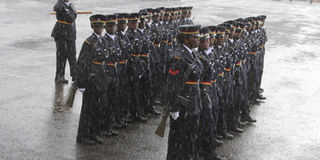Uhuru issues ultimatum over illegal weapons

Police recruits brave the rain during a pass out ceremony at Kiganjo Police Training college in Nyeri County on April 4, 2014. Photo/ JOSEPH KANYI
What you need to know:
- The President was addressing 2,209 police trainees who had completed their course at Kiganjo Police Training College. But he chose to respond to growing incidents of robbery with violence as well as terrorist attacks in the country.
- Mr Kenyatta directed his vent at refugees, some of who he said had abused the country’s hospitality by helping to bring in the explosives and other small arms.
President Uhuru Kenyatta on Friday issued a two-week ultimatum for the surrender of illegal weapons
President Kenyatta also warned that the country would not host refugees if it meant making the country unsafe.
In an address at a pass-out parade for the police, President Kenyatta said those who would not have handed in the arms “would invite” unspecified consequences to themselves.
“To those with illegal weapons, today we give them two weeks to surrender those weapons and we will pardon them. After two weeks, anyone who will not have surrendered unlicensed weapons would have invited whatever will happen to them.”
“We have said this many times but it is time to take action. I am giving two weeks amnesty to those with illegal arms, failure to which they shall face the full force of the law,” he said.
The President was addressing 2,209 police trainees who had completed their course at Kiganjo Police Training College. But he chose to respond to growing incidents of robbery with violence as well as terrorist attacks in the country.
Two weeks ago, two unidentified gunmen stormed a church in Mombasa in which six people were killed and several others injured.
A week later, three explosions in Nairobi’s Eastleigh area killed six people and wounded dozens.
The two events were followed by a police crackdown in Eastleigh in which more than 1000 suspected were arrested. Some Eastleigh residents though accused the police of harassment.
But President Kenyatta insisted no particular religion or tribe was being targeted.
“We are asking Kenyans wherever they are to support us in this endeavour. We are not at war with any religion. Our war is between us and terrorists who have no interest in the life of human beings.
We are not at war with any tribe. The war is between Kenyans and those who do not like peace.”
REFUGEES
Mr Kenyatta directed his vent at refugees, some of who he said had abused the country’s hospitality by helping to bring in the explosives and other small arms.
“For more than twenty years now, our country has been generous to our neighbours who have had problems in their respective countries. Kenya has welcomed more than one million from those countries that are unsafe and we did that out of our kind heart and for the love of peace.”
“But we cannot put up with people who continue to abuse our kindness to bring suffering to Kenyans.”
Kenya has two refugee camps at Kakuma in Turkana county and Dadaab in Garissa county which, in total, host more than 600,000 refugees.
But it is the Dadaab camp, mainly inhabited by Somalis who fled two decades of war in that country, that has been the most unsafe.
The government suspects the camp in Kenya’s north-east harbours sympathisers of Somali militants, al-Shabaab, which Kenya Defence Forces is fighting in Somalia alongside the Amisom Forces.
Last week, Interior Secretary Joseph Ole Lenku ordered that all refugees in urban areas go back to camps. The order was criticised by human rights organisation who argued that the refugees have been victims of terror as well.
Earlier in the day, Mr Kenyatta while speaking at the Catholic Vincentian Retreat Centre in Thika, (Kiambu County) for a special service argued all religious faiths in the country have a significant role to play.
“As you all know, we are faced with a resurgent extremist movement. It has set out to divide us against ourselves. By killing and maiming, it hopes to turn us against our brothers and sisters, and to destroy the nation we have laboured so long to build.
“They have learned too well the old Biblical lesson that a house divided against itself cannot stand”, said the President.
“Your ability to bring people together is a rare gift. For this nation, it is especially important, as we face new threats to our nationhood and our humanity from the evil acts of a few extremists in our midst.
Though we are angry, and resolved to bring the terrorists to justice, we can learn from your practices of penitence, reconciliation, and unity.”




